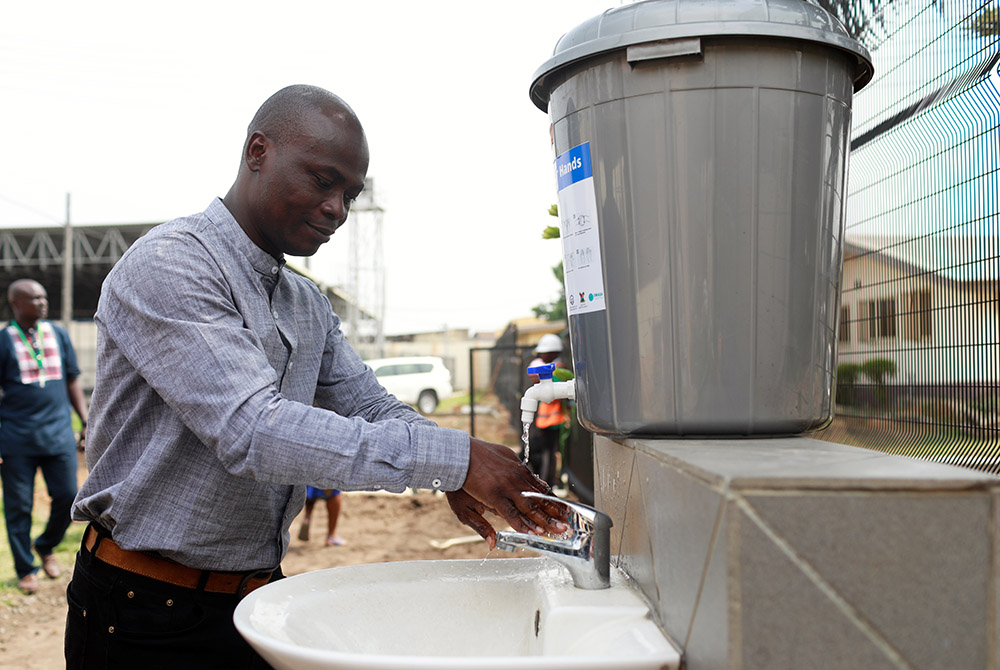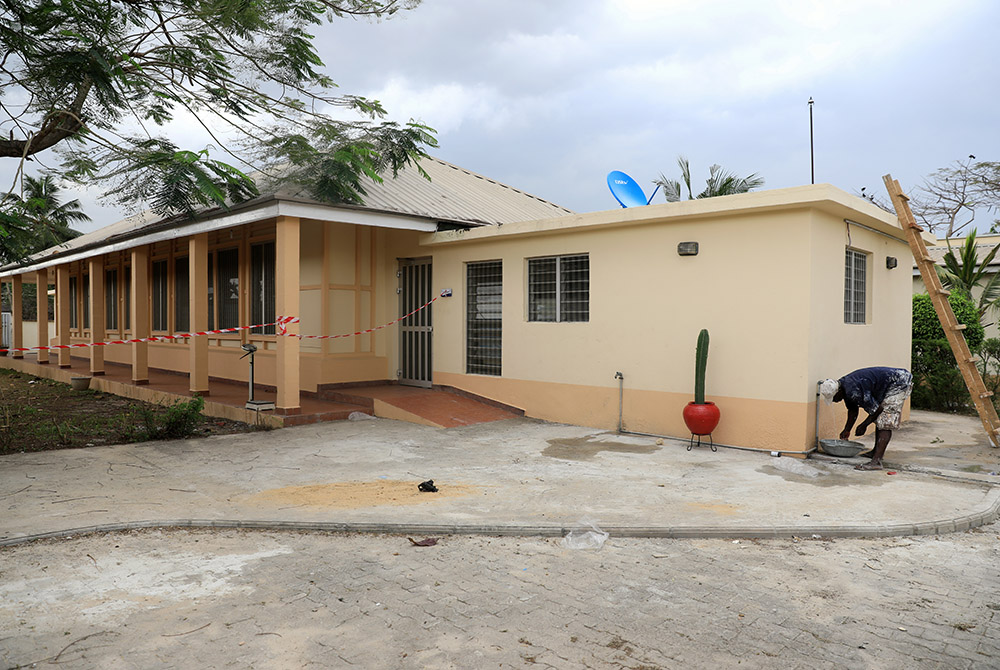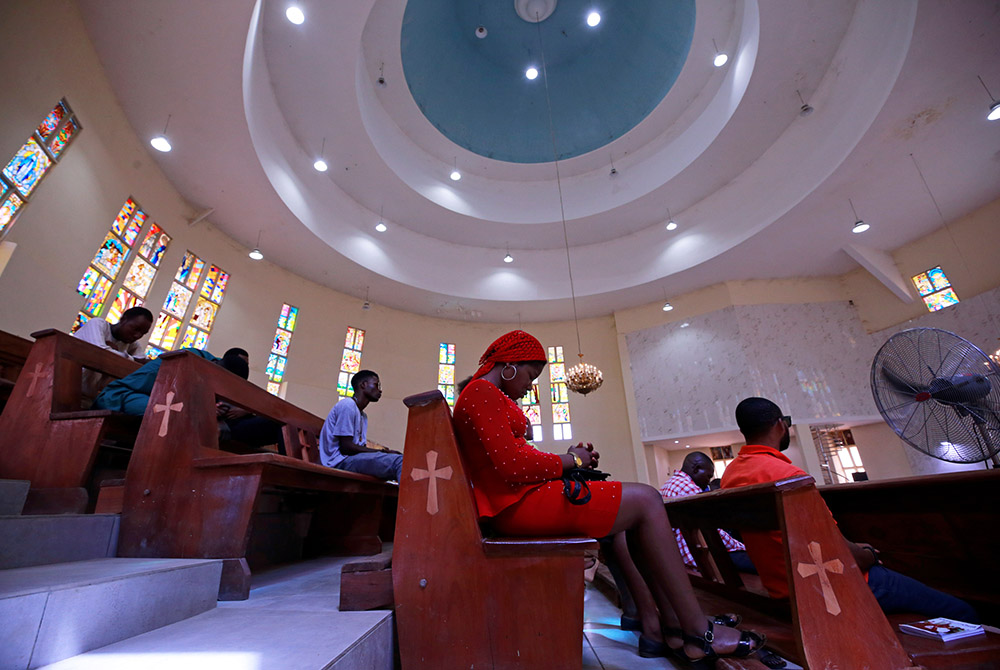
Dr. Bamidele Mutiu washes his hands March 6 near the biosecurity facility at the Mainland Hospital Yaba during the coronavirus pandemic in Lagos, Nigeria. (CNS/Temilade Adelaja, Reuters)
The Christian and Muslim communities in Nigeria are collaborating to respond and combat the growing coronavirus pandemic in the country in what has been described as a show of love and unity. The relationship between the two religious groups and their adherents in the country has been marred with tension and violence but the leaders are putting their differences aside to unite for a common cause.
The reported cases of the virus in Nigeria stands at 343 with 10 deaths and 91 recoveries on April 13 according to the Nigeria Centre for Disease Control, or NCDC, which gives hourly updates on the pandemic in the country. This is set to increase with the NCDC saying that it is still tracking 6,000 who have had contact with 111 infected persons, according to Information Nigeria.
"This is a show of love, unity and believe in one true God," Fr. Peter Ani, a priest at one of the dioceses in Southeast Nigeria, said. "In times of crisis, we need to put everything that divides us aside and come together to achieve a common goal, and I am happy that is what is presently happening."
The leaders of the Catholic Church in Nigeria have taken several measures and actions. They have suspended Masses, Easter activities and other gatherings in the Lagos Archdiocese, the Abuja Diocese and many other dioceses in the country, as a way of responding proactively to the pandemic. Masses are presently streamed live on social media, radio and online television channels.

A worker collects water beside the isolation building for coronavirus patients at a hospital March 6 in Lagos, Nigeria. (CNS/Temilade Adelaja, Reuters)
In northern Nigeria, religious leaders are taking steps to reduce the spread of the virus by suspending activities at mosques and other religious gatherings. On March 19, the Nigerian Supreme Council for Islamic Affairs, or NSCIA, the leadership body for Muslims in the country, issued some directives for mosque organizations and activities on how to combat the disease and prevent further transmission. They are urging their members to cooperate with appropriate authorities to limit the spread of the virus.
"It is important for everyone to take all necessary precautions to prevent the spread of the disease," according to a statement by the deputy secretary general of NSCIA, Salisu Shehu. "Such precautions include frequent handwashing with soap, limiting physical contact by giving salutations instead of shaking hands and hugging, observing proper hygiene when coughing or sneezing."
The statement called on imams, preachers and organizations to communicate about these precautionary steps.
"We urge mosques and Islamic centres to strongly discourage members from attending any mosque activities even if they are only experiencing mild symptoms," Shehu said. "It is obligatory for you to keep away and self-isolate if you have been diagnosed with Coronavirus in order to prevent the virus from spreading. Preventing harm, especially to the lives of others, takes precedence over the benefits of attending mosque activities."
On the same day that the NSCIA released the statement, the president of the Christian Association of Nigeria [CAN], Samson Ayokunle, called for national days of prayer in March "for an end to Coronavirus pandemic in Nigeria and all over the world."

Worshippers pray during a March 22 Mass at St. Gabriel Catholic Church, in Abuja, Nigeria, as African governments struggle to control the spread of the novel coronavirus. (CNS/Afolabi Sotunde, Reuters)
The Nigerian Supreme Council for Islamic Affairs is a member of the Nigeria Inter-Religious Council, or NIREC, which fosters peace, unity and strengthens the relationship between Christians and other religious bodies in the country. The NIREC, headed by a Catholic priest, Fr. Cornelius Omonokhua, has been collaborating with the Muslim organizations and leaderships in Nigeria on many fronts. Recently, as reported by Ripples Nigeria, during an interreligious council meeting, the leader of the Nigerian Supreme Council for Islamic Affairs, Muhammad Abubakar, emphasized the need to provide relief packages for citizens to help them during the pandemic, adding that hunger is deadlier than the coronavirus.
In NSCIA's March 19 statements, Shehu continued: "Business owners and traders should be urged to fear Allah and avoid hoarding essential products, creating artificial scarcity or unnecessary inflation of prices. Similarly, the populace should be considerate in their purchases and avoid reckless and extravagant purchases that prevent others from accessing essential commodities."
On March 3, more than 200 Christian and Muslim leaders under NIREC met with officials of the Lagos state government to discuss the steps taken and the way forward in combating the pandemic in the country. Lagos, Africa's most populous city with a population of more than 20 million people, is presently the epicenter of the disease in Nigeria, with 176 cases reported as of April 13, and a lockdown in place aimed at combating the disease.
At the meeting, governmental official, Prince Anofi Elegushi, commissioner for home affairs, said the purpose of the gathering was for religious leaders to be able to educate their worshippers and congregation in their various churches and mosques all over the state," according to a report by P.M. News Nigeria.
"What we need now is to join hands and support the government and other health authorities to combat this pandemic that has altered our lives and ways of living," Ani said. "We cannot make progress if we don't cooperate with all involved, especially those in the frontlines."
[Patrick Egwu is a freelance journalist based in Nigeria.]
Advertisement







